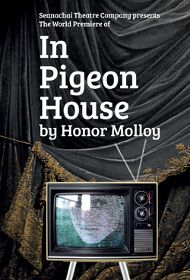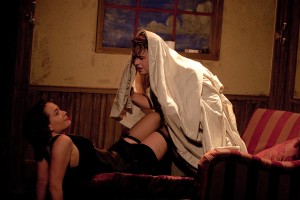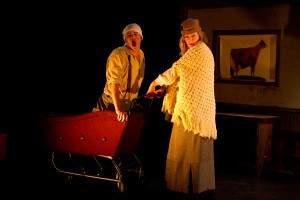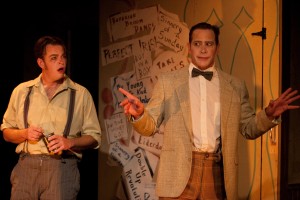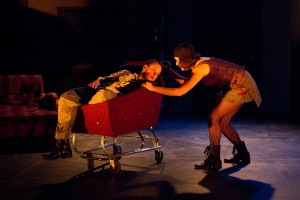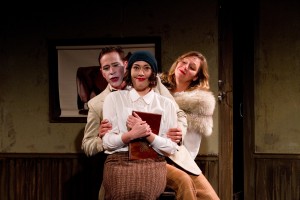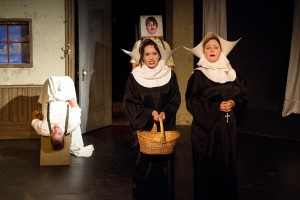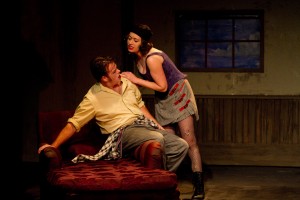I DON’T EVEN KNOW WHAT THE TITLE MEANS
Every once in a while, a theater company falls in love with a script and simply must stage it. I can’t imagine any other reason that Seanachaí decided to present In Pigeon House, a surreal Vaudeville by Honor Molloy which, even with Brian Shaw’s vibrant staging, Patrick McGee’s über-creative sets/props, and an entertaining quarto of loveable, roguish thespians, makes little to no sense to an audience (at least, not an American audience). Somewhere buried within this Irish traveling show and the burlesque shenanigans therein is a story, but it is practically incomprehensible.
Molloy seems to be paying tribute to the “fit-ups,” traveling companies which carried makeshift scenery and props that could be set up temporarily in Éire’s countryside. But this show isn’t a series of self-contained sketches, lampoons, and stories. Barely poking its head through the show is a tale involving the playwright’s own pater, Irish soap opera actor John Molloy, who began his own career in the fit-ups. And this is purely a guess based on the press notes.
There are scenes of family dysfunction performed “waka waka waka” style; there’s a monologue delivered by a man sitting in a crapper; two nuns appear and tell a perplexing tale as two other men are in separate torture devices of some kind; a man’s mater watches herself performing in younger days on the telly; etc. It all serves to confuse: Time and place seem irrelevant, bouncing between Dublin’s modern club scene and the early 20th century countryside; scenes are presented in an array of styles, from silent cinema to music hall; and the wobbly narrative (and that’s an understatement; there really is no narrative) takes a backseat to Molloy’s ingenious use of the language.
There are four archetypes: Rasher (Ira Amyx), the son/tenderfoot performer; Dolly (Katherine Schwartz), the put-upon girlfriend/daughter/ingénue; Masher (Barbara Figgins), the mother/veteran player; and Basher (John Mossman), the drunken, disappearing father/experienced theatrical old hand. Together, they offer abstract, indistinct vignettes about life upon the wicked stage and the effects it has on family dynamics.
But even though we don’t understand just what-in-the-hell is going on, it’s still a hoot. Mossman is especially enthralling as the kind of lascivious, Carn-Evil sideshow barker who invites you to step behind a scrim for a taste of hedonistic hell. Schwartz is both fiery when confronting the loser men in her life and vulnerable when relating a sad, sad tale of hoof-and-mouth disease. Figgins brings such a controlling unpredictability and mournful regret to her persona that had she suddenly pulled out a cleaver and chomped her fellow performers, I would have thought, “Yeah, I buy that.” And the mellifluous, gravel-voiced Amyx brings a manic, scary desperation and despair to the proceedings; he appears as the angry, lost soul from a drug-addled background.
So here are my questions: Is this a memory play buried in excessive repartee? Is it a performing, alcoholic household a la Eugene O’Neill covered up with Theater-of-the-Absurd existentialism? Is it yet another bit of insight into the drab, dreary, and depressing Irish life, but wrapped up in the painted, forced smile of a sad clown? I wonder if even the creators can answer these queries.
Utilizing a breakneck brawl of intensified linguistic mash-ups similar to Frank L. Baum’s Oz books, the Irish dialect seems better-suited to an Irish audience, even as the philological fantabulaciousness can be quite amusing. When a man thanks his girl for “one mad, fat rock of ya-yo,” I wondered if that was a term for sex, simply because they had intercourse (clothed) in another scene; upon research, it turns out to be slang for rock-cocaine. Again, all one can do is guess. I suspect the wondrousness of the staging and the broad physicality of the performers may hold some people’s attention, but it will be difficult to ignore that the audience is kept out of Molloy’s fantastical loop. My suggestion? At the risk of being maddeningly alienated, sample one mad, fat rock of ya-yo before taking your seat.
photos by Eileen Molony
In Pigeon House
Seanachaí Theatre Company at the Den Theatre
scheduled to end on November 18, 2012
for tickets, call (866) 811-4111 or visit http://www.seanachai.org
for info on this and other Chicago Theater, visit http://www.TheatreinChicago.com
